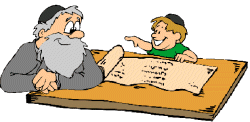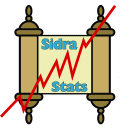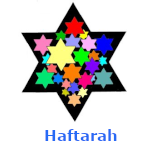Toledot
תּוֹלְדֹת
Gen. 25:19 – 28:9
Rebecca has twins
When Isaac was 40 years old, he married Rebecca, the daughter of Bethuel, the Aramaean of Padan Aram, and sister of Laban, the Aramaean. Although she was the daughter of a wicked man, and the sister of another wicked man, yet she was herself a righteous person. Rebecca was very young when she married Isaac so during the early years of their marriage she bore no children. Then another ten tears passed and still she had no children, so Isaac pleaded with HaShem for her sake. HaShem granted Isaac’s plea, and Rebecca became pregnant with twins. But the babies clashed inside of her, and she wondered why she was having such a painful and unusual pregnancy. She asked HaShem, “Why is this happening to me?”And HaShem said to her (through Abraham): “Two nations are in your womb. Two governments will come from inside you. And the one people shall be stronger than the other people, and the elder shall serve the younger.” When the time came for her to give birth, there were indeed two babies in her womb. The first was ruddy-complexioned with much red hair. They named him Esau. His brother then emerged and his hand was gripping Esau’s heel. Isaac named him Jacob. Isaac was 60 years old when Rebecca gave birth to the twins. The boys grew up and while they were small, there was no great difference between them. But when they reached 13, the differences in their disposition began to show. Esau became a skilled trapper, a man of the field. Jacob was a scholarly man who remained with the tents. Isaac enjoyed eating Esau’s game and favored him, but Rebecca favored Jacob.
Esau sells his birthright
Jacob was simmering a stew one day when Esau came home exhausted from the field and faint with hunger and thirst. Esau said to Jacob, “Give me some of that red, red stew! I’m hungry!” “First, sell me your birthright” replied Jacob. (A birthright is the portion and privilege that would automatically be inherited by the firstborn.) “Here I am about to die!” exclaimed Esau. “What good is my birthright to me?”
“Make an oath to me right now,” replied Jacob.
He made the oath, and so sold his birthright to Jacob. Jacob gave him some bread and some lentil stew. Esau ate, drank and got up and left, thus rejecting his birthright.
Isaac and the Philistines
There came a famine in the land, aside from the first famine in the time of Abraham. Isaac went to Abimelekh, King of the Philistines in Gerar, (probably to ask permission to go to Egypt). HaShem appeared to Isaac and said, “Do not go down to Egypt. You were consecrated as a sacrifice to HaShem, therefore you must not leave the Holy Land. Dwell in the land I will tell you of, set up your shepherd’s tents and do not fear for the lack of pasture. I will be with you and bless you, for unto you and your descendants I will give all these lands. Thus will I keep the oath that I made to your father, Abraham. I will make your descendants as numerous as the stars of heaven, and will give unto thy seed all these lands. All the nations of the earth shall be blessed through your descendants. All this because Abraham obeyed My voice, kept My charge (believed in Me as the only God and sought to teach this belief to others), My commandments (including that he leave his home, sacrifice his son, expel Hagar, etc.), My decrees (to be gracious and merciful, to do justice and righteousness and command his children to do likewise), and My laws (such as circumcision and the prohibition of swine’s flesh).”
And so Isaac came to settle in Gerar. When the local men asked about Rebecca, his wife, he told them that she was his sister. He was afraid to say that she was his wife because Rebecca was beautiful and Isaac feared the local men would kill him to get her. Once, after Isaac had been there a long time, Abimelekh, king of the Philistines, was looking out the window, he saw Isaac enjoying himself with his wife Rebecca. Abimelekh summoned Isaac. “Clearly, she is your wife, how could you have said she was your sister?”
“I was afraid that I would die because of her” Isaac replied. “What have you done to us?” demanded Abimelekh. “One of the people could have easily slept with her! You would have made us commit a terrible crime!” Abimelekh issued a decree: “Who ever touches this man or his wife shall surely be put to death.”
Isaac farmed in the area. That year he harvested a hundred times as much as he planted, because HaShem had blessed him. This was the beginning of his prosperity. He continued to prosper and grew very rich. He had flocks of sheep, herds of cattle, and a large household of servants. The Philistines became jealous of him. They plugged up all the wells that his father’s servants had dug while Abraham was still alive, and they filled them with earth. Abimelekh said to Isaac “Go away from us. You have become more powerful than we are.” Isaac left the area and camped in the Gerar Valley, intending to settle there. He redug the wells that had been dug in the days of his father Abraham, which had been plugged up by the Philistines after Abraham’s death. He gave them the same names as his father had given them. Isaac’s servants then dug in the valley, and found a new well, brimming over with fresh water. The shepherds of Gerar disputed with Isaac’s shepherds, claiming that the water was theirs. Isaac named the well Challenge (Esek), because they had challenged him.
Isaac’s servants dug another well, and it was also disputed. Isaac named it Accusation (Sitnah).
He then moved away from there and dug another well. This time it was not disputed, so he named it Wide Spaces (Rehoboth). “Now HaShem has made room for us and will grant us wide open spaces, and we will be fruitful in the land”.
From there Isaac went to Beer-Sheba. HaShem appeared to him that night and said, “I am the God of your father Abraham. Do not be afraid, for I am with you. I will bless you and grant you very many decedents because of my covenant with Abraham.”
Isaac built an altar there and called upon the name of the Lord. He set up his tents there and his servants dug a well in the area. Abimelekh came to Isaac from Gerar, along with a group of friends and his general, Pikhol. “Why have you come to me?” asked Isaac, “You hate me and drove me away from you!”
“We have seen that HaShem is with you” they replied. “We propose that there be a dread oath between you and us. Let us make a treaty with you, that even as we did not touch you, you will do us no harm. We did only good to let you leave in peace. Now you are the one who is blessed by HaShem.”
Isaac prepared a feast for them and they ate and drank. They got up early and made a mutual oath. Isaac then bid them farewell and they left in peace.
On that very day, Isaac’s servants came and told him about the well they had been digging. “We have found water!” they announced. Isaac named the well Shibah. The city was therefore called Beer-Sheba, and is to this very day.
Esau Marries
When Esau was forty years old, he married Judith, daughter of Beeri the Hittite, and Basemath, daughter of Elon the Hittite. His wives became a source of spiritual bitterness to Isaac and Rebecca, for they were rebellious and worshiped idols.
The Blessing
Isaac had grown old and his eyesight was fading. He summoned his elder son, Esau.
“My son,” Isaac called.
“Yes, I am here,” Esau said.
“I am old and have no idea when I will die. Now take your weapons–your quiver and your bow–go out into the field and trap me some game. Make it the way I like it and bring it to me to eat. My soul will then bless you before I die.”
Rebecca was listening outside of the tent. Esau went to trap some game. Rebecca told her son Jacob, “I just heard your father speaking to your brother. He said ‘bring me some game and prepare it into something tasty. I will eat it and bless you in HaShem’s presence before I die.’ Now my son, listen to me and follow my instructions carefully: go to the sheep and take two young choice kids. I will prepare them with a tasty recipe, just the way your father likes them. You must bring it to your father , so he will eat it and bless you before he dies.”
“But mother, Esau is a hairy man,” replied Jacob, “and I am so smooth-skinned. Suppose father touches me? He will realize that I am an imposter! I will gain a curse instead of a blessing!”
“Let the curse be on me, my son,” said his mother. “Go bring the things I asked for.”
Jacob did as his mother had asked. She prepared the meal, and then Rebecca took Esau’s best clothing which she had in her keeping and dressed Jacob in them. She also placed young goat’s skins on his arms and his neck.
Rebecca handed her son Jacob the delicacy and the bread she had made. He went to his father.
“Father?”
“Who are you my son?”
“It is I, Esau, your first-born,” said Jacob. “I have done as you asked. Sit up and eat the game I trapped, so your soul will bless me.”
“How did you find it so quickly?”
“HaShem your Lord was with me.”
“Come closer to me, let me touch you. Are you really Esau my son? The voice is Jacob’s, but the hands are the hands of Esau. Are you really my son Esau?”
“I am,” Jacob replied.
“Then serve me the food and my soul will bless you.” Isaac ate and Jacob brought him wine and he drank.
“Come closer my son, so I may kiss you.” As Jacob bent to kiss his father, Isaac smelled the fragrance of his clothing.
“See,” Isaac said, “my son’s fragrance is like the perfume of the field blessed by HaShem. So HaShem grant you the dew of heaven and the fat of the earth, and plenty of grain and wine. Let peoples serve you, and governments bow down to you. You shall be lord over your brethren, your mother’s children will prostrate themselves before you. Those who curse you are cursed, those who bless you are blessed.”
Isaac had finished blessing Jacob, and Jacob had just left his father’s tent, when his brother Esau came back from the hunt. “Let my father get up and eat his son’s venison,” he said, “so that your soul may bless me”
“Who are you?” his father asked.
“I am your first-born, Esau”
Isaac was seized with a violent fit of trembling “Who .. Where .. is the one who trapped the game and just served it to me? I ate it all before you came and I blessed him. The blessing will remain his.”
When Esau heard his father’s words, he let out the most loud and bitter scream. “Bless me too father,” he pleaded.
“Your brother came with guile and he has taken away your blessing,” said Isaac.
“Isn’t he truly named Jacob (Ya’akov)? He went behind my back (akav) twice. First he took my birthright and now he took my blessing. Couldn’t you have saved a blessing for me?”
His father replied, “It is true I have made him lord of you; all his brothers I have given to him as servants. The corn and wine, too, I have given him–what then shall I do for you, my son? The fat places of the earth can still be your dwelling, and you still have the dew of heaven. But you shall live by the sword. You may have to serve your brother, but there will come a time when you shall break loose, and you will throw his yoke off your neck.”
Esau hated Jacob because of the blessing. “The days of mourning for my father will be here soon,” Esau said, “and then I will be able to kill my brother Jacob.”
Her older son’s plans were reported to Rebecca. She summoned her son, Jacob. “Your brother is consoling himself by planning to kill you. Now, my son, listen to me. Set out and flee to my brother Laban in Charan. Remain with him awhile until your brother’s anger has subsided. When your brother has calmed down from his rage against you, and has forgotten what you have done to him, I will send word and summon you home. Why should I risk losing both of you on the same day?”
Rebecca went to Isaac and said, “I am disgusted with life because of those Hittite women (Esau’s wives). If Jacob marries such a Hittite girl, from the daughters of this land, why should I go on living?”
So Isaac summoned Jacob and gave him a blessing and a charge. “Do not marry a Canaanite girl. Go to Padan Aram, to the house of your maternal grandfather Bethuel. Marry a daughter of your uncle Leban, and HaShem will bless you, make you fruitful and increase your numbers. You will become an assembly of nations. He will grant Abraham’s blessing to you and your descendants, so that you may take over the land which HaShem gave to Abraham, where you previously lived only as a foreigner.”
Isaac then sent Jacob on his way. Jacob headed to Padan Aram, to Leban, son of Bethuel the Aramaean, the brother of Rebecca, Jacob and Esau’s mother.
Esau saw that Isaac had blessed Jacob and sent him to Padan Aram to find a wife; he also knew that Jacob would obey his father’s charge not to marry a Canaanite girl because they displeased his father. (In an effort to please his father,) Esau went to see Abraham’s son, Ishmael and he married Ishmael’s daughter, Machlath, who was also the sister of Nebayoth.
Haftarah Connection

Malachi 1.1-2.7
In this week’s parsha Jacob gets the birthright from Esau by selling him a bowl of red stew and then by taking his blessing from Isaac (at his mother’s insistence). It is clear that Jacob is the chosen one to continue the line of the Jewish People and carry out the legacy of Abraham forward.
In the Haftarah, the prophet Malachi finds himself facing an Israel that feels that HaShem does not love them. He recounts the story of Jacob and Esau and tells them that Jacob was chosen because HaShem saw a future in him for the Jewish people. The fact that the Jewish people are still there proves that HaShem still loves us.
Sidra Stats

- Sixth of 54 Sedras in the Torah
- Written on 173 lines in the Sefer Torah
- 106 P’sukim (verses)
- 1,432 words
- 5,426 letters
Next week’s Parashat: VaYetze


